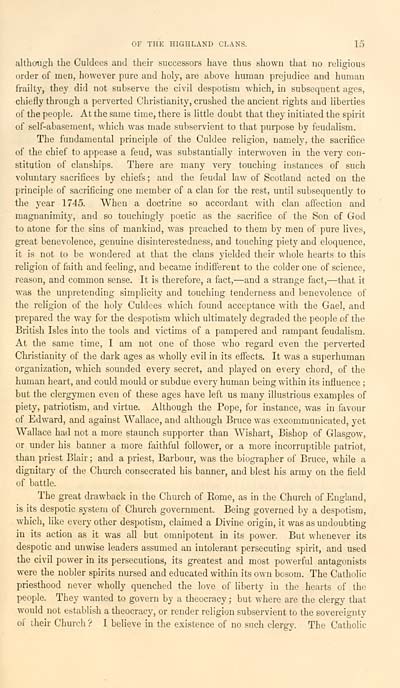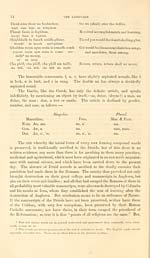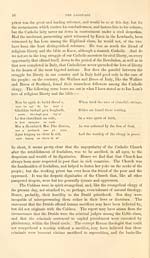Download files
Complete book:
Individual page:
Thumbnail gallery: Grid view | List view

OF THE HIGHLAND CLANS. 15
although the Culdees and their successors have thus shown that no religious
order of men, however pure and holy, are above human prejudice and human
frailty, they did not subserve the civil despotism which, in subsequent ages,
chiefly through a perverted Christianity, crushed the ancient rights and liberties
of the people. At the same time, there is little doubt that they initiated the spirit
of self-abasement, which was made subservient to that purpose by feudalism.
The fundamental principle of the Culdee religion, namely, the sacrifice
of the chief to appease a feud, was substantially interwoven in the very con-
stitution of clanships. There are many very touching instances of such
voluntary sacrifices by chiefs; and the feudal law of Scotland acted on the
principle of sacrificing one member of a clan for the rest, until subsequently to
the year 1745. When a doctrine so accordant with clan affection and
magnanimity, and so touchingly poetic as the sacrifice of the Son of God
to atone for the sins of mankind, was preached to them by men of pure lives,
great benevolence, genuine disinterestedness, and touching piety and eloquence,
it is not to be wondered at that the clans yielded their whole hearts to this
religion of faith and feeling, and became indifierent to the colder one of science,
reason, and common sense. It is therefore, a fact, — and a strange fact, — that it
was the unpretending simplicity and touching tenderness and benevolence of
the religion of the holy Culdees which found acceptance with the Gael, and
prepared the way for the despotism which ultimately degraded the people of the
British Isles into the tools and victims of a pampered and rampant feudalism.
At the same time, I am not one of those who regard even the perverted
Christianity of the dark ages as wholly evil in its effects. It was a superhuman
organization, which sounded every secret, and played on every chord, of the
human heart, and could mould or subdue every human being within its influence ;
but the clergymen even of these ages have left us many illustrious examples of
piety, patriotism, and virtue. Although the Pope, for instance, was in favour
of Edward, and against Wallace, and although Bruce was excommunicated, yet
Wallace had not a more staunch supporter than Wishart, Bishop of Glasgow,
or under his banner a more faithful follower, or a more incorruptible patriot,
than priest Blair ; and a priest, Barbour, was the biographer of Bruce, while a
dignitary of the Church consecrated his banner, and blest his army on the field
of battle.
The great drawback in the Church of Rome, as in the Church of England,
is its despotic system of Church government. Being governed by a despotism,
•which, like every other despotism, claimed a Divine origin, it was as undoubtiug
in its action as it was all but omnipotent in its power. But whenever its
despotic and unwise leaders assumed an intolerant persecuting spirit, and used
the civil power in its persecutions, its greatest and most powerful antagonists
were the nobler spirits nursed and educated within its own bosom. The Catholic
priesthood never wholly quenched the love of liberty in the hearts of the
people. They wanted to govern by a theocracy ; but where are the clergy that
would not establish a theocracy, or render religion subservient to the sovereignty
oi their Churcli ? I believe in the existence of no such clergy. The Catholic
although the Culdees and their successors have thus shown that no religious
order of men, however pure and holy, are above human prejudice and human
frailty, they did not subserve the civil despotism which, in subsequent ages,
chiefly through a perverted Christianity, crushed the ancient rights and liberties
of the people. At the same time, there is little doubt that they initiated the spirit
of self-abasement, which was made subservient to that purpose by feudalism.
The fundamental principle of the Culdee religion, namely, the sacrifice
of the chief to appease a feud, was substantially interwoven in the very con-
stitution of clanships. There are many very touching instances of such
voluntary sacrifices by chiefs; and the feudal law of Scotland acted on the
principle of sacrificing one member of a clan for the rest, until subsequently to
the year 1745. When a doctrine so accordant with clan affection and
magnanimity, and so touchingly poetic as the sacrifice of the Son of God
to atone for the sins of mankind, was preached to them by men of pure lives,
great benevolence, genuine disinterestedness, and touching piety and eloquence,
it is not to be wondered at that the clans yielded their whole hearts to this
religion of faith and feeling, and became indifierent to the colder one of science,
reason, and common sense. It is therefore, a fact, — and a strange fact, — that it
was the unpretending simplicity and touching tenderness and benevolence of
the religion of the holy Culdees which found acceptance with the Gael, and
prepared the way for the despotism which ultimately degraded the people of the
British Isles into the tools and victims of a pampered and rampant feudalism.
At the same time, I am not one of those who regard even the perverted
Christianity of the dark ages as wholly evil in its effects. It was a superhuman
organization, which sounded every secret, and played on every chord, of the
human heart, and could mould or subdue every human being within its influence ;
but the clergymen even of these ages have left us many illustrious examples of
piety, patriotism, and virtue. Although the Pope, for instance, was in favour
of Edward, and against Wallace, and although Bruce was excommunicated, yet
Wallace had not a more staunch supporter than Wishart, Bishop of Glasgow,
or under his banner a more faithful follower, or a more incorruptible patriot,
than priest Blair ; and a priest, Barbour, was the biographer of Bruce, while a
dignitary of the Church consecrated his banner, and blest his army on the field
of battle.
The great drawback in the Church of Rome, as in the Church of England,
is its despotic system of Church government. Being governed by a despotism,
•which, like every other despotism, claimed a Divine origin, it was as undoubtiug
in its action as it was all but omnipotent in its power. But whenever its
despotic and unwise leaders assumed an intolerant persecuting spirit, and used
the civil power in its persecutions, its greatest and most powerful antagonists
were the nobler spirits nursed and educated within its own bosom. The Catholic
priesthood never wholly quenched the love of liberty in the hearts of the
people. They wanted to govern by a theocracy ; but where are the clergy that
would not establish a theocracy, or render religion subservient to the sovereignty
oi their Churcli ? I believe in the existence of no such clergy. The Catholic
Set display mode to: Large image | Transcription
Images and transcriptions on this page, including medium image downloads, may be used under the Creative Commons Attribution 4.0 International Licence unless otherwise stated. ![]()
| Early Gaelic Book Collections > Blair Collection > Treatise on the language, poetry, and music of the Highland clans > (27) |
|---|
| Permanent URL | https://digital.nls.uk/76236700 |
|---|
| Description | A selection of books from a collection of more than 500 titles, mostly on religious and literary topics. Also includes some material dealing with other Celtic languages and societies. Collection created towards the end of the 19th century by Lady Evelyn Stewart Murray. |
|---|
| Description | Selected items from five 'Special and Named Printed Collections'. Includes books in Gaelic and other Celtic languages, works about the Gaels, their languages, literature, culture and history. |
|---|

